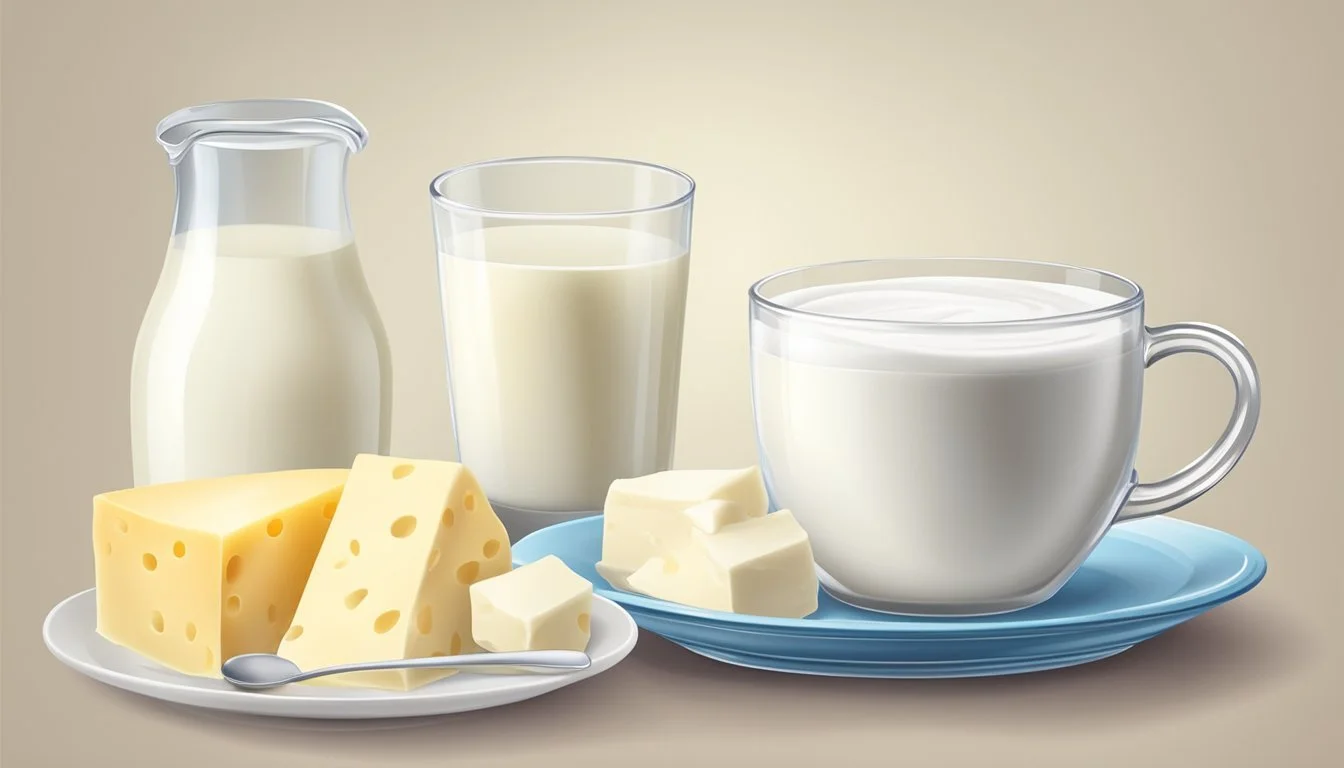Can I Drink Unpasteurized Milk and Eat Unpasteurized Dairy Products During Pregnancy?
Understanding the Risks
Consuming unpasteurized milk and dairy products during pregnancy is not recommended due to safety concerns. Unpasteurized milk, also known as raw milk, can harbor a range of harmful bacteria, including Listeria, Salmonella, and E. coli. These pathogens pose significant health risks to pregnant individuals, potentially leading to serious infections or complications.
During pregnancy, the immune system is naturally suppressed, making expecting mothers more susceptible to foodborne illnesses. The potential consequences of consuming contaminated unpasteurized dairy can be severe, not just for the pregnant individual, but also for the unborn baby. Infections such as listeriosis can lead to miscarriage, stillbirth, or severe illness in newborns.
Pasteurization is the process of heating milk to a high temperature to kill off bacteria without fundamentally changing the nutritional value of the milk. As such, pasteurized dairy products are considered safe for consumption during pregnancy when handled and stored properly. Pregnant individuals should look for labels indicating dairy products are pasteurized and follow food safety guidelines to minimize the risk of foodborne illness.
Understanding Pasteurization
In pregnancy, it's crucial to recognize the role of pasteurization in ensuring the safety of dairy products. This process significantly reduces health risks that can affect both the expectant mother and the fetus.
Definition and Process
Pasteurization is the method of heat treating milk and other dairy products to eliminate harmful bacteria. This process involves heating the liquid to a specific temperature for a set period before cooling it rapidly. The critical parameters typically used for pasteurization are a temperature of 161 degrees Fahrenheit (71.7 degrees Celsius) held for 15 seconds or, alternatively, heating at 145 degrees Fahrenheit (62.8 degrees Celsius) for 30 minutes.
Target Temperatures for Pasteurization
High-Temperature Short-Time (HTST): 161°F for 15 seconds
Low-Temperature Long-Time (LTLT): 145°F for 30 minutes
During this heat treatment, pathogens such as Listeria, Salmonella, E. coli, and Mycobacterium bovis are inactivated, without significant loss of nutrients. It is a misconception that pasteurization drastically depletes nutritional value. While there may be minor changes, pasteurized milk retains most of its essential nutrients, like proteins, calcium, and vitamins.
Benefits for Pregnant Women
The benefits of consuming pasteurized dairy products during pregnancy are primarily related to safety. Unpasteurized milk can harbor dangerous bacteria, posing severe health risks to the expectant mother and the developing fetus, including miscarriage, premature birth, or neonatal infections.
Safety Benefits to Pregnant Women
Reduced risk of foodborne illness
Protects the developing fetus from potential pathogens
Ensures nutrient intake is maintained with minimized risk
Pregnant women are advised to choose pasteurized dairy products to avoid these risks. The pasteurization process offers the assurance that milk is safe to consume while still providing essential nutrients such as calcium and vitamin D, necessary for the health of the mother and the growth of the baby.
Risks of Unpasteurized Milk during Pregnancy
Consuming unpasteurized milk during pregnancy carries significant health risks due to potential exposure to harmful bacteria not eliminated without pasteurization.
Potential Pathogens
Unpasteurized milk can be a breeding ground for dangerous microorganisms. Some of the most common bacteria found in unpasteurized milk include:
Listeria monocytogenes: Can cause listeriosis, which may lead to miscarriage, stillbirth, or severe infection in the newborn.
Salmonella spp.: Known for causing food poisoning, with symptoms ranging from diarrhea to more severe complications.
Escherichia coli (E. coli): Certain strains can cause severe foodborne illness, leading to dehydration and kidney problems.
Campylobacter: Often responsible for bacterial infections that can result in symptoms like fever, diarrhea, and abdominal pain.
Specific Risks to Pregnancy
The consumption of unpasteurized milk during pregnancy heightens the risk for conditions that can affect both the mother and the unborn child, such as:
Miscarriage: Harmful bacteria, particularly Listeria, can increase the risk of miscarriage due to infection.
Stillbirth: Infection from Listeria and other pathogens has been linked to an elevated risk of stillbirth.
Food Poisoning: Pregnant individuals are particularly susceptible to foodborne illnesses that can lead to dehydration and other complications.
In summary, unpasteurized milk should be avoided during pregnancy to mitigate the risks posed by these pathogens.
Regulatory Stance on Dairy Consumption
Both the FDA and CDC have issued specific guidelines regarding the consumption of dairy products during pregnancy, emphasizing food safety and the prevention of foodborne illness.
FDA and CDC Guidelines
The Food and Drug Administration (FDA) and the Centers for Disease Control and Prevention (CDC) strongly advise against the consumption of unpasteurized milk and unpasteurized dairy products during pregnancy. They emphasize that these products can contain harmful bacteria such as E. coli, Listeria, Salmonella, and Campylobacter. These pathogens can lead to serious health complications for both the mother and the developing fetus, including miscarriage, neonatal infection, or even stillbirth.
Listeria Prevention: Among their prevention strategies, these agencies particularly highlight the risk of Listeriosis, a disease caused by Listeria monocytogenes. Pregnant women are advised to consume only pasteurized dairy products to mitigate this risk.
Regulatory Oversight: The FDA, in collaboration with the U.S. Department of Agriculture (USDA), also regulates the production and distribution of dairy products to ensure their safety, enforcing pasteurization as a critical control point in dairy processing.
International Perspectives
Internationally, regulatory stances can vary, but many developed countries maintain similar guidelines to those of the USA, requiring pasteurization of milk and dairy products to be sold to the public. These regulations are designed to safeguard consumers against foodborne illnesses. Some countries might allow the sale of unpasteurized dairy products under strict conditions, but these are generally not recommended for consumption during pregnancy due to the increased risk of infection.
Specific Guidelines: When traveling abroad, it is crucial for pregnant women to adhere to the FDA and CDC guidelines, avoiding unpasteurized dairy products to prevent potential exposure to dangerous pathogens.
Adherence to Regulations: Compliance with these regulations is essential to guarantee that all dairy consumed is free from pathogens that could pose a health risk during pregnancy.
Dairy Products and Pregnancy Safety
During pregnancy, ensuring the safety of dairy products is crucial for the health of both the mother and the developing fetus. Pregnant women are advised to avoid unpasteurized milk and products made from it due to the risk of foodborne illnesses.
Cheese and Soft Cheeses
Unpasteurized soft cheeses are particularly susceptible to carrying harmful bacteria, including Listeria, which can lead to serious complications during pregnancy such as miscarriage or premature delivery. Safe consumption entails choosing cheeses that are clearly labeled as pasteurized. Soft cheeses to avoid unless pasteurized include:
Brie
Feta
Camembert
Blue cheese
Queso blanco
Queso fresco
On the other hand, hard cheeses, even if unpasteurized, are generally considered safe due to their lower moisture content which is less conducive for bacterial growth.
Safe Handling and Consumption
When handling dairy products, pregnant women should always ensure proper storage and preparation to avoid contamination. Dairy should be kept refrigerated at or below 40°F (4°C) and consumed before the expiration date. For additional safety measures:
Read labels carefully to confirm if the dairy product is pasteurized.
In the absence of pasteurization information, it is best to avoid the product.
Practice good hygiene, such as washing hands before and after handling dairy products.
Alternatives to Unpasteurized Dairy
When pregnant, it's important to avoid unpasteurized dairy due to the risk of foodborne illnesses. Fortunately, there are numerous safe and nutritious alternatives that ensure adequate intake of calcium and essential vitamins.
Safe Dairy Alternatives
Pasteurized Milk: It is treated to eliminate harmful bacteria and is a rich source of calcium and vitamin D, crucial for bone health during pregnancy.
Yogurt: Opt for pasteurized, whole milk yogurt or Greek yogurt which retain the necessary nutrients without the added risk of bacteria.
Ice Cream: Ensure any ice cream consumed is made from pasteurized milk and cream.
List of pasteurized dairy products ideal for pregnant individuals:
Dairy Product Key Nutrients Pasteurized Milk Calcium, Vitamin D Yogurt Probiotics, Protein Ice Cream Calcium, Phosphorus
Plant-Based Options
Plant-based milk alternatives are lactose-free and enriched with calcium and other vitamins to meet nutritional needs.
Almond Milk: Often fortified with calcium and vitamins A, D, and E.
Soy Milk: A good protein source and usually fortified like cow's milk.
Coconut Milk: Available fortified and is a creamy alternative for cooking or baking.
Examples of plant-based options suitable during pregnancy:
Plant-Based Milk Fortified Nutrients Almond Milk Calcium, Vitamin D Soy Milk Vitamin B12, Protein Coconut Milk Vitamin C, Iron
These alternatives can ensure that pregnant persons have access to safe dairy options while maintaining a balanced intake of necessary nutrients.
Common Misconceptions
When discussing the consumption of unpasteurized milk and dairy products during pregnancy, it's crucial to address common misconceptions about their safety and nutritional profile.
Myths about Nutritional Value
Many believe that unpasteurized milk provides a superior nutritional value compared to its pasteurized counterpart. This belief is often rooted in the idea that pasteurization destroys beneficial enzymes and reduces the milk's natural vitamins and minerals. However, scientific evidence indicates that pasteurization has a minimal effect on the nutritional content of milk. The key nutrients, including calcium and protein, remain largely intact after the process.
Misunderstanding Bacterial Risks
Another misconception is the underestimation of bacterial risks associated with unpasteurized dairy products. Some individuals assume that their immune systems can handle potential pathogens or that contamination is rare. On the contrary, unpasteurized milk can contain harmful microorganisms such as Salmonella, E. coli, and Listeria, which can lead to serious health issues, specifically in vulnerable populations like pregnant women. The risks of contamination stem from several factors:
Contact with cow excrement
Bacteria present on the animal's skin
Environmental contaminants
Diseases in the cow itself
Contaminated raw milk can lead to life-threatening illnesses not only for the expectant mother but also for the unborn child.
Preparing for a Healthy Pregnancy
Ensuring the health of both mother and baby during pregnancy involves careful consideration of dietary choices. Special attention should be given to both the nutritional value of food and the prevention of foodborne illnesses, which can significantly affect the well-being of both.
Dietary Guidelines
Pregnant women should focus on maintaining a balanced diet that includes a variety of fruits, vegetables, whole grains, lean proteins, and dairy. Adequate intake of essential nutrients such as folic acid, calcium, iron, and vitamins D and B12 supports fetal development and maternal health. It is crucial to only consume dairy products that have been pasteurized to ensure the safety and health of both the mother and baby.
Dairy Products:
Safe: Pasteurized milk, yogurt, and hard cheeses
Avoid: Unpasteurized milk and soft cheeses made from raw milk
Proteins:
Include: Cooked fish, lean meats, and eggs
Limit: High-mercury fish and raw or undercooked meats
A pregnant individual's caloric intake generally needs to be increased. However, they should opt for nutrient-dense foods over empty calories.
Avoiding Foodborne Illness
To reduce the risk of foodborne illness, it is vital to practice proper food safety techniques. The immune system in pregnant women is naturally suppressed, which makes them more susceptible to infections such as listeriosis and other food-related diseases. Listeriosis in particular can lead to serious complications like miscarriage, stillbirth, premature labor, and can be life-threatening for newborns.
Prevention Tips:
Handwashing: Regularly wash hands before and after handling food.
Cooking: Ensure that all meats, poultry, and eggs are thoroughly cooked.
Cleaning: Keep kitchen surfaces and utensils clean to prevent cross-contamination.
Storing Foods: Store perishable foods at proper temperatures to inhibit bacterial growth.
Avoiding unpasteurized milk and products made from it is a recommended practice. Cooking dairy products to kill any harmful bacteria before consuming is advised if there is any doubt about the pasteurization process. Pregnant women should also be cautious about consuming soft cheeses, deli meats, and refrigerated smoked seafood, as these can be sources of harmful bacteria.
Recognizing Symptoms of Infection
Expectant mothers need to be vigilant for signs of foodborne illness, as their immune systems are often more susceptible. Recognizing symptoms early can mitigate health risks to both the mother and the unborn child.
Identifying Listeriosis
Listeriosis, caused by the Listeria monocytogenes bacteria, often manifests as a fever and may be accompanied by other symptoms such as muscle aches, nausea, and diarrhea. The infection is particularly concerning during pregnancy as it can lead to more severe complications like miscarriage, stillbirth, and preterm labor. Pregnant women should monitor for flu-like symptoms such as fever and fatigue, which are subtle yet significant indications of listeriosis.
Common symptoms include:
Persistent fever
Muscle aches and cramps
Nausea or vomiting
Diarrhea
Actions to Take After Exposure
If a pregnant woman has consumed unpasteurized milk or dairy products and exhibits symptoms of listeriosis or any related illness, she should seek medical attention promptly. Early intervention with antibiotics can prove to be effective. Healthcare providers can offer diagnostic tests to confirm listeria infection and commence appropriate treatment. It is crucial for pregnant women to inform their healthcare provider about the consumption of potentially contaminated food to ensure a timely and accurate diagnosis for starting treatment.
Frequently Asked Questions
In addressing the topic of consuming unpasteurized dairy products during pregnancy, expectant mothers often have specific concerns and questions. It is crucial for them to consult healthcare providers for personalized advice and to understand the potential risks involved.
Common Queries from Expectant Mothers
Expectant mothers frequently question the safety of drinking unpasteurized milk or eating unpasteurized dairy products during pregnancy. Health experts advise against it because raw products can contain harmful bacteria like Listeria, which can lead to severe illness or pregnancy complications. Symptoms from infections like listeriosis can be subtle but may include fever, muscle aches, or gastrointestinal distress.
Question: Is it safe to consume unpasteurized milk products while pregnant?
Answer: It is not recommended because of the higher risk of foodborne illnesses which can affect both mother and child.
Question: What are the possible symptoms of an infection from unpasteurized dairy during pregnancy?
Answer: Symptoms may include fever, nausea, and vomiting, and in severe cases, it can lead to more serious complications.
Addressing Concerns with Healthcare Providers
Consultation with healthcare providers is essential for expectant mothers considering dietary choices. They can offer guidance on safe food practices and address any symptoms or concerns.
Question: Should I discuss my dairy intake with my healthcare provider?
Answer: Yes, discussing all aspects of diet, including dairy intake, ensures the health and safety of both mother and baby.
Question: How can I differentiate between normal pregnancy symptoms and symptoms from a foodborne illness?
Answer: Any unusual or severe symptoms should be discussed with a healthcare provider to rule out foodborne illness.







